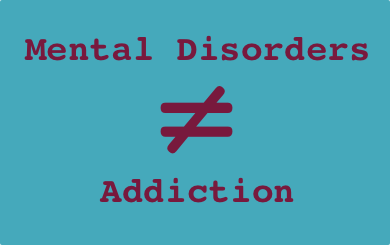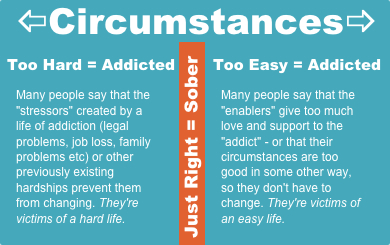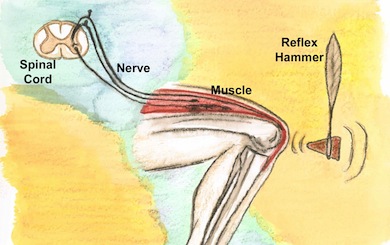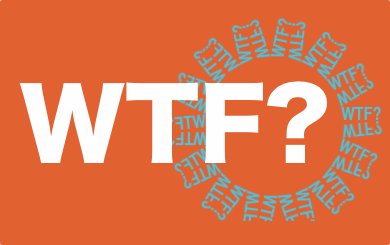In an analysis of nicotine, cannabis, alcohol, and cocaine users (in which a vast majority were diagnosed with mood and anxiety disorders), the researchers found that: “No association was observed between mood and anxiety disorders and dependence remission for any of the substances assessed.”
Author: Steven Slate
Steven Slate has personally taught hundreds of people how to change their substance use habits through choice - while avoiding the harmful recovery culture and disease model of addiction.
Victims of circumstance: How to avoid being a delicate addict on the edge of relapse
In the model of addiction that pegs external circumstances as the cause of addiction, recovery, and relapse – relapse is always inevitable. There’s always an excuse.
Quick answer: You can avoid being a delicate addict on the verge of relapse by refusing to blame circumstances (and other external factors) for your substance use – and simply owning it as a choice freely made for immediate pleasure/happiness.
There is only one way to “recover” from “addiction”
There is only one way to “recover.” Hint: it’s not a program, treatment, medication, support system, alternative coping method, therapy, etc. The only way to recover is…
Toronto mayor smoked crack. So what? Does that make him an addict?
Mayor Rob Ford of Toronto has admitted to smoking crack once. Research shows it’s wrong to assume he’s a crackhead or crack addict – yet these myths persist
The Misguided Obsession with Heroin / Opiate Maintenance Drugs (Suboxone, Subutex, Buprenorphine, Methadone)
Two fairly recent stories discussing Suboxone / Buprenorphine have me shaking my head. In one, a pregnant woman who had already quit using opiates was punished for refusing to take Suboxone. In another, it is claimed that Glee actor Cory Monteith wouldn’t have died from overdose, if only he had been prescribed some sort of… Continue reading The Misguided Obsession with Heroin / Opiate Maintenance Drugs (Suboxone, Subutex, Buprenorphine, Methadone)
Is Addiction a reflex?
“So, what exactly is addiction?” And in response, he calls it a reflex, and he describes what I think we’re supposed to believe is the neural activity involved in the reflex. But he never quite describes how that translates into the actual behavior that’s usually described as addiction – nor does he assert, in his response, that it even does translate into the action of substance use. Instead, he offers a sort of half-answer, that encourages the listener to fill in the gaps, and become smokescreened into believing that substance use, for addicts, is an involuntary behavior akin to a sneeze or blink. What else could his use of the term “reflex” imply?
Alcoholic Ex-Cons Become Moderate Drinkers
One fact that enough people clearly do not know is that moderation is a possible and probable outcome for people with substance use problems. I stumbled onto a good example of that today while looking through a great book published back in 1981: Controlled Drinking by Nick Heather and Ian Robertson. They reviewed a study… Continue reading Alcoholic Ex-Cons Become Moderate Drinkers
How to stupefy 1,700 troubled people a day
I just found an old article by a seasoned treatment provider/12-step supporter, Dr Abraham Twerski. He’s a psychiatrist who founded the Gateway Rehabilitation Center in 1972, writes extensively, and tours the world speaking about recovery. He also offers a wonderful example of the double-talk, nonsense, and brazen self-contradictory messages of the recovery culture. Check out… Continue reading How to stupefy 1,700 troubled people a day
13th Step Film Needs Your Support
13th Stepping is a term that refers to the act of more experienced 12-step support group members taking advantage of newer, more desperate and impressionable 12-step group attendees – financially, or sexually. At times, it’s been referred to jokingly. I remember a movie with Greg Kinnear and Gary Shandling where they used AA meetings as… Continue reading 13th Step Film Needs Your Support
What Marc Maron Taught Me about Medical Malpractice
Slate.com recently featured an article by Yale Psychiatry resident physician Arjune Rama in which he interviewed comedian Marc Maron (host of the populare WTF podcast) about addiction, titled What Marc Maron Taught Me About Addiction. However, it seemed more like Maron was interviewing the doctor: Slate: A big problem for psychiatrists when it comes to understanding… Continue reading What Marc Maron Taught Me about Medical Malpractice







